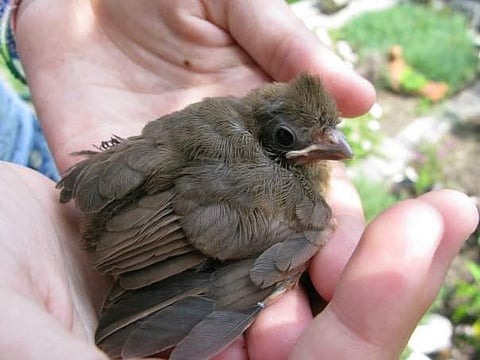

Rainy, windy Bengaluru has witnessed a lot of fallen trees and branches. This has also spelt trouble for our feathered friends who call these trees their home. It's common for chicks to fall to the ground from their nests this time of the year since they can't fly like the older birds. Shamita, from local rescue centre People For Animals (PFA) gives us some tips on what citizens should do if they come across a fallen bird.
* The first thing to do is to identify the bird from a distance so one can ascertain its species. If you can't, observe the chick from a distance and observe its behaviour
*If you can't see its parents coming to save it and the nest is not too high up, you can attempt to place it back in the nest. However, be sure to use a soft cloth and cover parts of its face. Birds go into a state of shock in situations like this, so be gentle to reduce the shock.
*It's a common assumption that human touch and smell on a baby bird causes birds to abandon their chicks. This is completely false and just a belief. Birds can't smell human touch, so if it is possible to put the bird back, don't hesitate on those grounds
*If its parents aren't nearby and the nest can't be reached/identified, take the bird home and place it in a box that isn't too big or too small and has plenty of holes for ventilation. It is essential that the right temperature conditions are maintained
*Do not feed the bird unless you know what the particular species is used to eating. Water should be put in a bowl rather than hand fed. Young birds need to be fed by their mothers, so if the bird isn't eating or drinking, take it to a rescue centre. These centres have the necessary formulas and know-how to feed chicks
*Don't house them for too long before taking it to a rescue centre, as it might have not eaten or had any water for days. Go drop off the bird at the centre, or if you can't, a pick up will be arranged
In case you see a chick that has fallen from its nest and are not sure about what to do, call PFA's rescue helpline at +91 99000 25370
(This story was first published in the New Indian Express)
